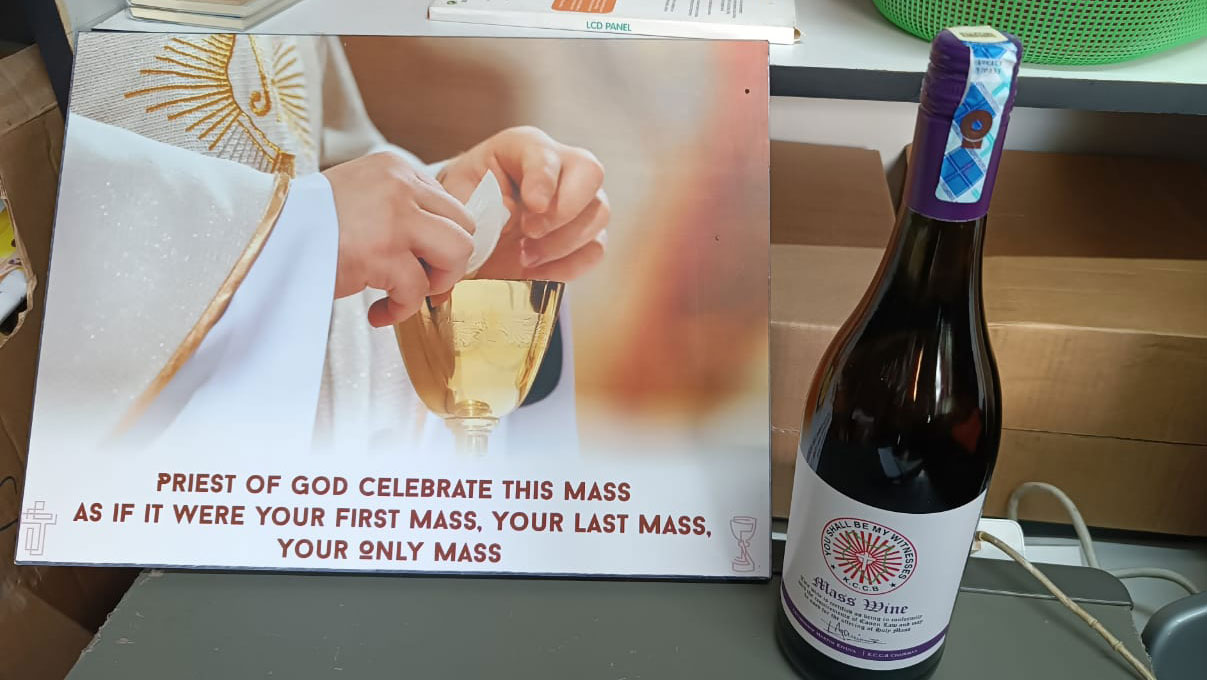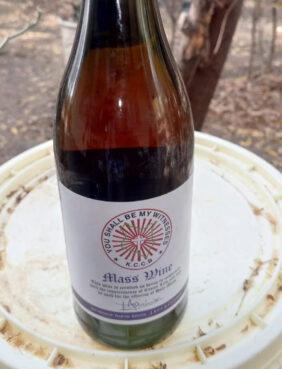
NAIROBI, Kenya (RNS) — As part of a new national policy on drugs and alcohol, Kenyan government officials have been considering raising the drinking age to 21, from 18. But one new brand of imported South African wine is restricted to an even more select buyer: Catholic priests.
The wine is a proprietary brand the country’s Catholic bishops have adopted after bars and liquor stores began selling the wine Catholic churches had long dispensed at Communion.
“You can’t buy it unless you are a priest or you have a letter from your church. Those are my instructions,” said an attendant at the Holy Family Basilica in Nairobi, where the wine is sold at the gift shop.
Before adopting the new brand, Kenyan bishops had no control over the wine used at Mass, which was supplied by the Kenya Wine Agencies, a partly government-owned entity. It is readily available at Christian bookshops, gift shops and churches, where it was labeled altar wine with a cross prominently stamped on the bottle, but without specifying any ownership by a religious denomination. It sells for about 1,100 Kenya shillings, or 13 U.S. dollars.
But a few years ago, the altar wine began appearing in supermarkets and other places alcohol is sold. “We felt this was a kind of abuse or an act of sacrilege,” said the Rev. Joachim Omolo Ouko, a priest in the Archdiocese of Kisumu, in a recent telephone interview. “So that is why the bishops opted to change not the label, but completely to a different wine.”
Some sources said Kenya Wine Agencies also had trouble matching the church’s demand for sacramental wine.
Archbishop Maurice Muhatia Makumba, chairman of the Kenya Conference of Catholic Bishops, announced the change Oct. 4 to thousands of Catholics gathered for the church’s 38th National Prayer Day at Subukia National Shrine, a Catholic retreat center northwest of Nairobi.
“This is (the) only wine going forward that will be used in the celebration Mass in the whole of the country. Kindly, don’t buy the other one,” Makumba said in his announcement.

The wine can only be purchased by Kenya’s Catholic priests for use as altar wine. Courtesy Fredrick Nzwili
The new wine is produced by Lutzville Vineyards in Western Cape Province in South Africa and will be imported by the church, according to church sources. Priests using the wine will need to confirm that it bears the bishops’ conference emblem and the signature of the chairman of the conference before use. It will be sold only to priests or those who can prove they have the authority from a church or a priest.
According to the Rev. Gerald Matolo, a priest in the Diocese of Wote, in Eastern Kenya, the sacredness of the old altar wine was also compromised as Kenya has liberalized its market over the past few decades, allowing alcoholic drinks from many sources to flow into the country.
According to the country’s Alcoholic Beverages Association, the sale of products packaged to look like the genuine brands and sold at cheaper prices is outpacing that of legal products. Experts blame the situation on weak enforcement of alcohol control policies, corruption and the inability of the enforcement officers to identify counterfeits when the products are being released into the market.
Matolo said the counterfeiting included the wine used on the altar. “I think some people have collected used bottles and put some other alcoholic beverages in them. We may have been using ethanol in our sacraments,” he said.
While sacramental wine used in Catholic churches must be made only from grapes and be pure, there are no other restrictions on its color or its qualities as wine. Nor is it considered to be sacred until it is consecrated during the Eucharistic celebration. But in Kenya, where some 80% of residents are Christian and half the Christians are Catholic, even the unconsecrated wine is highly respected.
Charles Onyango, a Catholic from Kajiado Diocese, said he had heard that the wine used at Mass was the same as that sold in nearby bars but didn’t want to believe it.
Some Kenyan Catholics said the bishops had been aware that the wine had been making its way to recreational drinking spots for years but took time to act. “The bishops were told about it, but the only thing is that our bishops are too slow in deciding,” said Omolo. “It takes them time. So, it’s been almost four or six years.”
